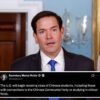WASHINGTON: Tech billionaire Elon Musk announced his departure from the Trump administration on Wednesday after serving as a key figure in a federal government cost-reduction project.
Musk, who joined the administration in January, expressed gratitude to President Donald Trump for the opportunity to help reduce wasteful spending.
In a post on X, Musk stated, “As my scheduled time as a Special Government Employee comes to an end, I would like to thank President @realDonaldTrump for the opportunity to reduce wasteful spending.”
He also highlighted the ongoing efforts of the Department of Government Efficiency (DOGE), which he led, emphasizing that the mission would continue to strengthen as it becomes integrated into government operations.
An unnamed White House official confirmed Musk’s departure to Reuters and the Associated Press, noting that his role was limited to a 130-day term for special government employees. Despite the exit, the White House assured that initiatives aimed at reducing federal spending and restructuring government agencies would persist.
While initially promising to cut at least $1 trillion from the federal budget, Musk’s team reports approximately $175 billion in savings so far—roughly $1,089 per taxpayer. The efforts faced challenges, especially amid recent legislative developments.
Over the weekend, Musk voiced concerns about a large legislative package deemed the “big, beautiful bill,” which extends President Trump’s 2017 tax cuts and introduces work requirements for food assistance and Medicaid.
Musk criticized the bill for increasing the budget deficit, which is projected to rise by $3.9 trillion by 2034, potentially nullifying DOGE’s cost-saving efforts.
The bill, passed by the House last week and awaiting Senate approval, also allocates funding for projects such as the US-Mexico border wall and enhanced Immigration and Customs Enforcement (ICE) activities.
If enacted in its current form, it could significantly undermine the government’s efforts to reduce spending, raising questions about the future trajectory of federal budget management initiatives.



